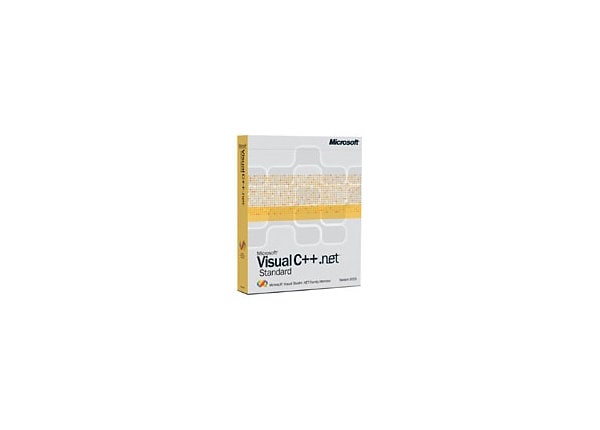
Know your gear
Microsoft Visual C++ .NET 2003 is the powerful tool for creating Microsoft Windows -based and Microsoft .NET-connected applications, dynamic Web applications, and XML Web services using the C++ development language.
This robust development environment comprises compilers that are highly-conformant to the International Standards Organization (ISO), a Standard Template Library (STL) implementation, industry-standard Active Template Library (ATL) and Microsoft Foundation Class (MFC) libraries, and powerful integrated development environment (IDE) features enabling efficient editing and debugging of source code.
Visual C++ .NET 2003 is a systems-level language, enabling the creation of best-in-class Windows-based and .NET-connected applications. With Visual C++ .NET 2003, developers can build highly tuned managed applications and components for .NET. Using simple managed extensions to the language, code and data-types are compiled for the .NET common language runtime (CLR) as fully optimized Microsoft intermediate language (MSIL) instructions. Developers can easily incorporate features of the .NET Framework, including full garbage collection, attributes, and threading, into C++ applications. Unique to Visual C++ is the ability to call unmanaged C++ code and ActiveX components using the highest performing interoperability technology on .NET.
Building on its roots, Visual C++ .NET 2003 continues to enable developers to build entirely unmanaged Windows-based applications and components. In this release, the compiler is enhanced with several new and improved optimizations and capabilities, including Whole Program Optimization, the ability to generate optimized code for recent processor technologies (including the Intel Pentium 4), and the ability to better optimize for processors with Streaming SIMD Extension (SSE and SSE2) support. Visual C++ developers also enjoy the unique ability to move their existing code to .NET granularly and at a self-defined pace. The Visual C++ compiler builds existing C++ sources for the .NET CLR without requiring code rewrites. A C++ application can exist partially as managed code and partially as native C++ code executing directly on the hardware processor - the developer has full control over this partitioning.
The Visual C++ .NET 2003 compiler is highly conformant with the ISO C++ language definition, and easily builds modern C++ code and library sources. New features include several advanced template features defined by the ISO standard, such as Partial Template Specialization and Partial Ordering of Function Templates. These features enable developers to write more compact and reusable code. Modern C++ libraries, including Loki, Boost, and Blitz, now compile easily with Visual C++ .NET 2003, giving Visual C++ developers the ability to incorporate these popular sources in their own applications.
The Visual C++ .NET compiler offers developers a slew of new and improved code-generation and tuning features, among them Whole Program Optimization. Whole Program Optimization allows the compiler to perform optimizations using information on all modules in the program, instead of traditional optimizations that can see only a single module at a time. With information on all modules, the compiler can optimize the use of registers across function boundaries and inline functions in a module even when the function is defined in another module. Whole Program Optimization results in dramatic increases in application performance for very little cost.
Visual C++ .NET ships with Microsoft's most conformant ANSI/ISO C++ compiler ever, with new support for such standard-defined features as covariant return types. Advanced language features defined by the standard enable developers with more powerful options for implementing common OO patterns and ultimately simplifying code while increasing its reusability. The Standard C++ Library (STL) is also enhanced with increased standards compliance, new container classes, better support for thread-safe coding, and greatly enhanced source code readability (code formatting).
This robust development environment comprises compilers that are highly-conformant to the International Standards Organization (ISO), a Standard Template Library (STL) implementation, industry-standard Active Template Library (ATL) and Microsoft Foundation Class (MFC) libraries, and powerful integrated development environment (IDE) features enabling efficient editing and debugging of source code.
Visual C++ .NET 2003 is a systems-level language, enabling the creation of best-in-class Windows-based and .NET-connected applications. With Visual C++ .NET 2003, developers can build highly tuned managed applications and components for .NET. Using simple managed extensions to the language, code and data-types are compiled for the .NET common language runtime (CLR) as fully optimized Microsoft intermediate language (MSIL) instructions. Developers can easily incorporate features of the .NET Framework, including full garbage collection, attributes, and threading, into C++ applications. Unique to Visual C++ is the ability to call unmanaged C++ code and ActiveX components using the highest performing interoperability technology on .NET.
Building on its roots, Visual C++ .NET 2003 continues to enable developers to build entirely unmanaged Windows-based applications and components. In this release, the compiler is enhanced with several new and improved optimizations and capabilities, including Whole Program Optimization, the ability to generate optimized code for recent processor technologies (including the Intel Pentium 4), and the ability to better optimize for processors with Streaming SIMD Extension (SSE and SSE2) support. Visual C++ developers also enjoy the unique ability to move their existing code to .NET granularly and at a self-defined pace. The Visual C++ compiler builds existing C++ sources for the .NET CLR without requiring code rewrites. A C++ application can exist partially as managed code and partially as native C++ code executing directly on the hardware processor - the developer has full control over this partitioning.
The Visual C++ .NET 2003 compiler is highly conformant with the ISO C++ language definition, and easily builds modern C++ code and library sources. New features include several advanced template features defined by the ISO standard, such as Partial Template Specialization and Partial Ordering of Function Templates. These features enable developers to write more compact and reusable code. Modern C++ libraries, including Loki, Boost, and Blitz, now compile easily with Visual C++ .NET 2003, giving Visual C++ developers the ability to incorporate these popular sources in their own applications.
The Visual C++ .NET compiler offers developers a slew of new and improved code-generation and tuning features, among them Whole Program Optimization. Whole Program Optimization allows the compiler to perform optimizations using information on all modules in the program, instead of traditional optimizations that can see only a single module at a time. With information on all modules, the compiler can optimize the use of registers across function boundaries and inline functions in a module even when the function is defined in another module. Whole Program Optimization results in dramatic increases in application performance for very little cost.
Visual C++ .NET ships with Microsoft's most conformant ANSI/ISO C++ compiler ever, with new support for such standard-defined features as covariant return types. Advanced language features defined by the standard enable developers with more powerful options for implementing common OO patterns and ultimately simplifying code while increasing its reusability. The Standard C++ Library (STL) is also enhanced with increased standards compliance, new container classes, better support for thread-safe coding, and greatly enhanced source code readability (code formatting).


